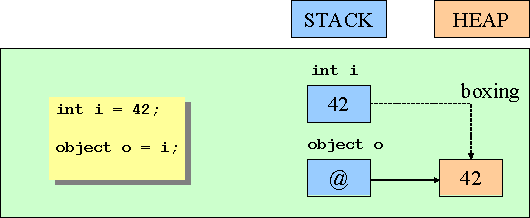As you have just seen, variables of type object can refer to any object of any reference type. That is, they can refer to any instance of a class. However, variables of type object can also refer to a value type. For example, the following two statements initialize the variable i (of type int, a value type) to 42 and then initialize the variable o (of type object, a reference type) to i:
int i = 42; object o = i;
The effect of the second statement is subtle. Remember that i is a value type and it exists in the stack. If the reference inside o referred directly to i, the reference would be referring to the stack. However, all references refer to objects on the heap. Instead, a piece of memory is allocated from the heap, an exact copy of the value inside i is stored in this piece of memory, and the reference inside o is pointed to the copy. (Creating references to items on the stack could seriously compromise the robustness of the runtime, and create a potential security flaw, so it is not allowed.) This automatic copying of an item from the stack to the heap is called boxing. The following graphic shows the result:
